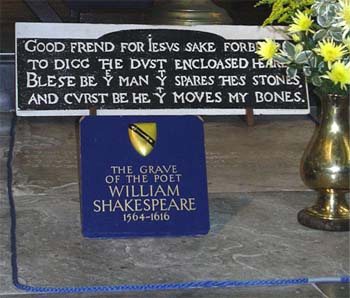To join in the celebrations of Shakespeare’s birthday, here is a repost of something I wrote in 2012 for the Royal Shakesepare Company as part of their ‘Happy Birthday Shakespeare’ collection.
 The date of an author’s death is always more important than that of his birth. This is not to say that we shouldn’t be celebrating Shakespeare’s entry into the world, but rather that we must not lose sight of the importance of his exit, itself taking place (perhaps) fifty-two years to the day after the Bard’s birth. Given that it is possible that Shakespeare, like Cassius in his Julius Caesar, died on his birthday, I will therefore take this occasion to wish him, simultaneously, Happy Birthday and, I suppose, Happy…errr…Anniversary. I have my reasons for this.
The date of an author’s death is always more important than that of his birth. This is not to say that we shouldn’t be celebrating Shakespeare’s entry into the world, but rather that we must not lose sight of the importance of his exit, itself taking place (perhaps) fifty-two years to the day after the Bard’s birth. Given that it is possible that Shakespeare, like Cassius in his Julius Caesar, died on his birthday, I will therefore take this occasion to wish him, simultaneously, Happy Birthday and, I suppose, Happy…errr…Anniversary. I have my reasons for this.
You see, I’m interested in copyright. The death of the author is more important than his birth because it is, in many jurisdictions, from this moment that we now measure the time before the author’s works enter into the public domain. Of course, Shakespeare was born, wrote and died at a time when copyright law was rather different, but this certainly doesn’t mean that he has escaped the web of regulations that have governed texts over the years.
Were it not for the copyright-infringing actions of a part-time printer, part-time seller of home remedies (one Robert Walker), actions that forced a price war and put cheap editions of Shakespeare out on the streets of eighteenth-century London, we probably wouldn’t be celebrating William’s birthday (or, in my case, his death) now. These cheap editions made Shakespeare well known to all, a theatrical commodity at a time when theatres were beleagured and were in desperate need of a name that was “no doubt marketable”. From there, thanks to Garrick, Pope, Voltaire, and many others, the rest is history…and more copyright disputes.
Even though Shakespeare died three hundred and ninety-six years ago, many of his plays are still in copyright. This is not because Shakespeare has become legally immortal, but rather because we have no unquestionably authoritative texts for any of his plays. Instead, every editor decides whether Hamlet wants his “solid”, “sullied” or “sallied” flesh to melt, copyrights his choice and its explanation, and charges all and sundry for the use of his text. A set quantity of years after that editor’s departure from this world, his text becomes free to use. As a result, full access to the latest, most academically-rigorous texts of Shakespeare is always the length of a copyright term away from the those who do not or cannot pay for the privilege.
This is important. Take the visualisations on the RSC’s My Shakespeare website, as an example. The emotional colouring of King Lear may well look a bit different if we follow either a quarto-based or a folio-based edition of the play. Similarly, the quotes used in Branagan’s ‘Shakespeare by Chance’ are obviously dependant on the latest critical readings of a textual crux. Visualisations based on up-to-date texts are thus still a long way off, since Shakespeare is always evolving, each editor and publisher giving his words new life, and thus – to look at it a different way – a new birthday, a new future death, and, following that event, a new distant entry into the public domain.
This is, however, changing. On 23rd April 2012, fittingly enough, PlayShakespeare.com released a modern, critically-rigorous and machine-readable, edition of Shakespeare’s works, choosing to remove all copyright restrictions from the start. Of course, their text will one day be superseded by new literary discoveries, but it certainly brings the public, analysable, free Shakespeare forward by no “small time”. More scrupulous visualisations are of course now possible, but, beyond this, one hopes for larger things. PlayShakespeare.com’s text has the potential to change Shakespeare’s online presence, currently dominated by the out-of-copyright 1898 Moby edition, digitised in 1993.
Even more importantly, it might make us think before we cut and paste what purports to be the Bard on the internet: whose Shakespeare is this? and, ultimately, whose Shakespeare are we wishing Happy Birthday to?
3 responses to “Commemorating Shakespeare”
Wonderful web site. Plenty of useful info here. I am sending it to several buddies ans also sharing in delicious.
And certainly, thank you to your sweat!
I’Ԁ like to tɦank you for tҺe efforts you Һave pսt in writing tҺіs
site. І am hoping tto check οut tthe ѕame
high-grade сontent frоm yоu in tҺe future as well. In fɑct, уour creative writing
abilities Һas inspired me too gеt my very οwn website now 😉
Thank you a lot for sharing this with all folks you really know what you are
talking approximately! Bookmarked. Please also discuss with my
site =). We can have a hyperlink exchange agreement between us